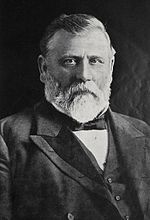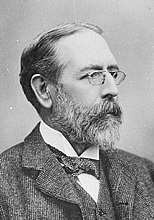1896 New Zealand general election
From Wikipedia, the free encyclopedia
The 1896 New Zealand general election was held on Wednesday, 4 December in the general electorates, and on Thursday, 19 December in the Māori electorates to elect a total of 74 MPs to the 13th session of the New Zealand Parliament. A total number of 337,024 (76.1%) voters turned out to vote.[1]
| |||||||||||||||||||||||||||||||||||||
All 74 seats in the New Zealand House of Representatives 38 seats were needed for a majority | |||||||||||||||||||||||||||||||||||||
|---|---|---|---|---|---|---|---|---|---|---|---|---|---|---|---|---|---|---|---|---|---|---|---|---|---|---|---|---|---|---|---|---|---|---|---|---|---|
| Turnout | 76.1% | ||||||||||||||||||||||||||||||||||||
| |||||||||||||||||||||||||||||||||||||
 Results of the election. | |||||||||||||||||||||||||||||||||||||
| |||||||||||||||||||||||||||||||||||||
1896 was the year the limit of £200 was placed on each candidate's campaign spending.
Background
The Liberal government campaigned on a platform that the election was between the people and the "selfish few". The economy stagnated, raising unemployment, which caused support for the Liberals to fall in the cities and they lost many seats, though not enough to be removed from office by the Conservatives. In rural areas, the swing in support was not as large due to the public works and land settlement programmes helping to support the regions.[2] In June 1896 Seddon had replaced Joseph Ward as Finance Minister whilst the latter had resigned after being declared temporarily bankrupt. As such Seddon himself took on the workload of the treasury making him more susceptible to opposition attacks over the economy. He proved to be a cautious financier, budgeting for surpluses while maintaining the spirit of self reliance his predecessor John Ballance had advocated.
Results
Summarize
Perspective
Party totals
The following table gives party strengths and vote distribution according to Wilson (1985), who records Maori representatives as Independents prior to the 1905 election.[3]
 | ||||||
|---|---|---|---|---|---|---|
| Election results | ||||||
| Party | Candidates | Total votes | Percentage | Seats won | Change | |
| Liberal | 81 | 184,650 | 54.78% | 39 | -12 | |
| Conservative | 70 | 114,574 | 33.99% | 26 | +13 | |
| Independent | 60 | 37,800 | 11.23% | 9 | -1 | |
Votes summary
The table below shows the results of the 1896 general election:
Key
Liberal Conservative Independent Liberal Liberal–Labour Independent
Table footnotes:
- Robert Thompson was regarded as Liberal in the previous Parliament
- Frederick Pirani was regarded as Liberal in the previous Parliament
- George Warren Russell distanced himself from the Liberal Party and, together with Frederick Pirani, unsuccessfully tried to form the Radical Party[42]
- Lindsay Buick distanced himself from the Liberal Party and became an Independent Liberal-Labour candidate[49][50]
- Robert Stout was regarded as Liberal in the previous Parliament
- The affiliation of Thomas Ellison, who is listed in most contemporary sources under his Māori name Tame Rangiwahia Erihana, is not known
The election of Thomas Wilford for the electorate of Suburbs of Wellington was declared void by an election petition on the grounds of corrupt and illegal practices. Charles Wilson was elected MP for that electorate following a by-election on 23 April 1897.
Summary of changes
- A boundary redistribution resulted in the abolition of seven seats:
- Chalmers, held by John A. Millar
- Inangahua, held by Patrick O'Regan
- New Plymouth, held by Edward Smith
- Pareora, held by Frederick Flatman
- Rangitata, held by William Maslin
- Waimea-Sounds, held by Charles Mills
- Waipa, held by Frederic Lang
- At the same time, seven new seats came into being:
Notes
References
Wikiwand - on
Seamless Wikipedia browsing. On steroids.


